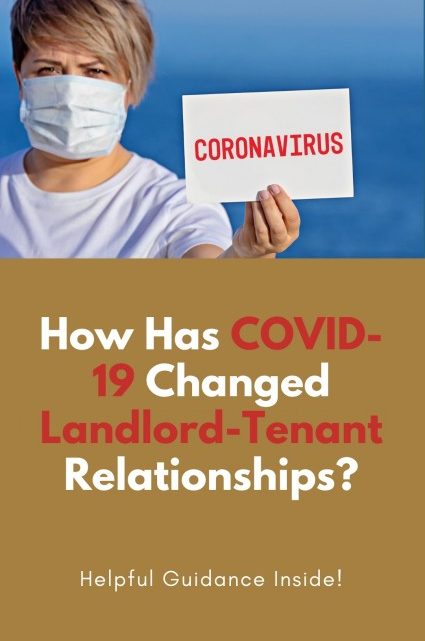Tenant-Landlord Relationships During The Pandemic
With the coronavirus, government lock downs have resulted in plenty of business owners having to temporarily close their businesses and lose a sizable chunk of profit. With their businesses unable to function normally, owners have been forced into having difficult conversations with their landlords that can drastically shift the commercial real estate landscape.
Commercial lease agreements don’t have a pandemic clause for this unique situation, and with previous precedents lacking, both landlords and tenants have found themselves in unchartered territories when it comes to negotiating arrangements such as rent reductions or waivers. Renting has been a touch different than trying to sell a home during the Covid-19 pandemic.
This scenario illustrates the need for such agreements to undergo certain changes – especially having learned some valuable things from the current adversity.
Introduction of turnover rents
 With the coronavirus lock downs, cash flow problems are a huge issue for many property owners. Many have only been able to collect a small portion of their total rent resulting in lower loan repayments and the potential breach of loan covenants.
With the coronavirus lock downs, cash flow problems are a huge issue for many property owners. Many have only been able to collect a small portion of their total rent resulting in lower loan repayments and the potential breach of loan covenants.
Both landlords and occupants have had to revisit the terms of their leases and find a structure to provide landlords with greater certainty of the tenancy and cash flow in exchange for a rental structure that’s sustainable.
To mitigate this issue, there have been discussions globally about turnover rents – where the rent is based on gross income generated by the tenant. This shift helps in aligning the interests of landlords and tenants so that each can share the highs and lows of the broader economy.
Buttonwood commercial property managers explained to us the pros and cons of turnover rents: “One benefit of turnover rents is that both the landlord and tenant are incentivized to operate under a common objective: to maximize retail sales turnover. While the tenant will be motivated to maximize profit, the landlord will want to help the tenant with this aim as it will ultimately increase their income.
Though turnover rents are great for helping businesses through tough economic times, they come with their difficulties too, in the sense, they are more complicated to draft and manage.”
Shifting of lease requirements
Since most lease contracts don’t explicitly dictate what happens during an epidemic or pandemic, there is generally minimal obligation for the landlord to provide any rent concession. As this is a curve ball that nobody expected however, lease terms could shift significantly in the upcoming months.
Some changes that could occur include the terms of a lease (US) or tenancy agreement (UK), the level of security needed by a landlord, changes in rent, and more. In particular, there’s most likely going to be heightened legal scrutiny when it comes to dealing with rent reductions or rent deferrals especially in the case of a crisis of this nature.
While there has generally been consensus when it comes to being flexible on rent, and being able to support distressed industries. There’s still a need to be cautious however when it comes to the shift of lease requirements as it could discourage investors and result in the further slumping of the economy. There can be differences in eviction processes as well.
Parties all need to work collaboratively together to allow businesses to flourish, and for assets to grow in value.
Increased cooperation
The pandemic has also brought about a renewed focus in ensuring that buildings are safe and accessible when employees finally return to work.
Building safety is crucial, and all buildings are required to legally meet certain codes and rules that set minimum safety standards. These codes not only help with decreasing the risk of injuries, but it also helps with natural disasters and a range of other threats.
In recent years, there have been innovative advancements when it comes to building safety such as the improvement of structural resilience for buildings that help in handling weather events and natural disasters, along with the incorporation of low-carbon input materials and systems.
The highest grade of waterproofing solutions has also helped in ensuring that commercial buildings are disaster-proof, and are safe.
Stepping up & sanitizing
Property managers and landlords are on the front lines, working not only to accommodate renters but to deal with everyday emergencies while people shelter in place.
There are new demands in multi-family and multi-tenant buildings well, with more measures being taken to clean and sanitize highly trafficked areas, install more hand sanitizing stations and work to oversee common spaces to ensure that social distancing requirements are met.
While there are no official COVID-19 hygiene or sanitation recommendations for property managers or landlords, the Chamber of Commerce some excellent tips specific cleaning guidelines for businesses and employers (which covers commercial landlords). The CDC also has guidelines as well. In their guide they state:
- Coronaviruses on surfaces and objects naturally die within hours to days. Warmer temperatures and exposure to sunlight will reduce the time the virus survives on surfaces and objects.
- Normal routine cleaning with soap and water removes germs and dirt from surfaces. It lowers the risk of spreading COVID-19 infection.
- Disinfectants kill germs on surfaces. By killing germs on a surface after cleaning, you can further lower the risk of spreading infection. EPA-approved disinfectants are an important part of reducing the risk of exposure to COVID-19. If disinfectants on this list are in short supply, alternative disinfectants can be used (for example, 1/3 cup of bleach added to 1 gallon of water, or 70% alcohol solutions). Bleach solutions will be effective for disinfection for up to 24 hours.
- Store and use disinfectants in a responsible and appropriate manner according to the label. Do not mix bleach or other cleaning and disinfection products together–this can cause fumes that may be very dangerous to breathe in. Keep all disinfectants out of the reach of children.
- Do not overuse or stockpile disinfectants or other supplies. This can result in shortages of appropriate products for others to use in critical situations.
- Always wear gloves appropriate for the chemicals being used when you are cleaning and disinfecting. Additional personal protective equipment (PPE) may be needed based on setting and product. For more information, see CDC’s website on Cleaning and Disinfection for Community Facilities.
- Practice social distancing, wear facial coverings, and follow proper prevention hygiene, such as washing your hands frequently and using alcohol-based (at least 60% alcohol) hand sanitizer when soap and water are not available.
The landscape is shifting
With a shift in the landscape, what’s most important is that tenants and landlords continue to have a good relationship with fruitful conversations. When tenants decide to renegotiate their lease benefits, it’s up to both parties to be willing to work together and continue having viable long-term relationships.
In this current situation, choosing to be stubborn will result in the detriment of the other, and will eventually benefit no one.
Lessons should be learned, and both parties need to be flexible and creative when it comes to dealing with these challenges. Failure to embrace these changes will only result in dire consequences in the long-term.
Other Relevant Massachusetts Real Estate News Resources
- Refinancing a home during Covid-19 – if you are going to be refinancing your house, it makes sense to understand what is going on in the finance industry during the pandemic. Get helpful tips and advice in this insightful article.
 About the author: The above article on how Covid-19 has impacted tenant-landlord relationships was written by Sam Radbil. Sam is an author at ABODO Apartments, an online apartment marketplace that helps renters find apartments all across the country. ABODO reports on rent rates, the changing of real estate markets, and trends within the real estate industry.
About the author: The above article on how Covid-19 has impacted tenant-landlord relationships was written by Sam Radbil. Sam is an author at ABODO Apartments, an online apartment marketplace that helps renters find apartments all across the country. ABODO reports on rent rates, the changing of real estate markets, and trends within the real estate industry.









No Comment